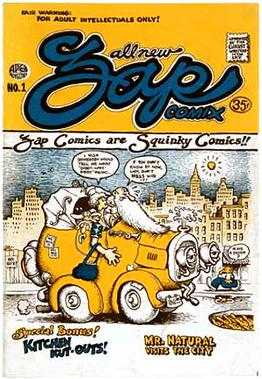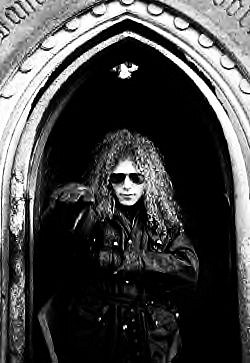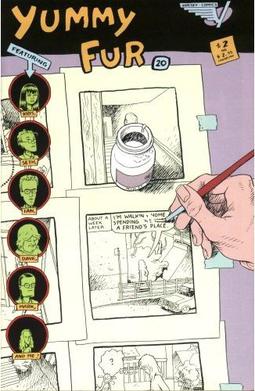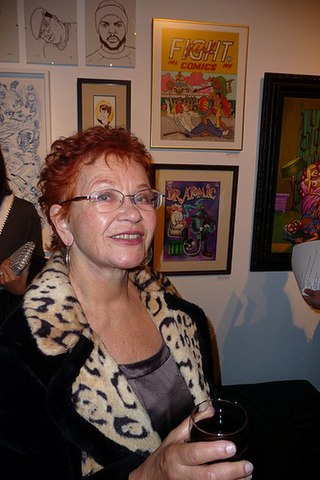
Robert Dennis Crumb is an American cartoonist and musician who often signs his work R. Crumb. His work displays a nostalgia for American folk culture of the late 19th and early 20th centuries, and satire of contemporary American culture.

Underground comix are small press or self-published comic books that are often socially relevant or satirical in nature. They differ from mainstream comics in depicting content forbidden to mainstream publications by the Comics Code Authority, including explicit drug use, sexuality, and violence. They were most popular in the United States in the late 1960s and 1970s, and in the United Kingdom in the 1970s.

The Comics Journal, often abbreviated TCJ, is an American magazine of news and criticism pertaining to comic books, comic strips and graphic novels. Known for its lengthy interviews with comic creators, pointed editorials and scathing reviews of the products of the mainstream comics industry, the magazine promotes the view that comics are a fine art, meriting broader cultural respect, and thus should be evaluated with higher critical standards.

Peter Bagge is an American cartoonist whose best-known work includes the comics Hate and Neat Stuff. His stories often use black humor and exaggerated cartooning to dramatize the reduced expectations of middle-class American youth. He won two Harvey Awards in 1991, one for best cartoonist and one for his work on Hate. In recent decades Bagge has done more fact-based comics, everything from biographies to history to comics journalism. Publishers of Bagge's articles, illustrations, and comics include suck.com, MAD Magazine, toonlet, Discover, and the Weekly World News, with the comic strip Adventures of Batboy. He has expressed his libertarian views in features for Reason.

Charles Burns is an American cartoonist and illustrator. His early work was published in a Sub Pop fanzine, and he achieved prominence in the early issues of RAW. His graphic novel Black Hole won the Harvey Award.

Fritz the Cat is a comic strip created by Robert Crumb. Set in a "supercity" of anthropomorphic animals, it focused on Fritz, a feline con artist who frequently went on wild adventures that sometimes involved sexual escapades. Crumb began drawing the character in homemade comic books as a child. Fritz became one of his best-known characters, thanks largely to the motion picture adaptation by Ralph Bakshi.

Harvey Kurtzman was an American cartoonist and editor. His best-known work includes writing and editing the parodic comic book Mad from 1952 until 1956, and writing the Little Annie Fanny strips in Playboy from 1962 until 1988. His work is noted for its satire and parody of popular culture, social critique, and attention to detail. Kurtzman's working method has been likened to that of an auteur, and he expected those who illustrated his stories to follow his layouts strictly.

Jeff Smith is an American cartoonist. He is best known as the creator of the self-published comic book series Bone.

Vaughn Bodē was an American underground cartoonist and illustrator known for his character Cheech Wizard and his artwork depicting voluptuous women. A contemporary of Ralph Bakshi, Bodē has been credited as an influence on Bakshi's animated films Wizards and The Lord of the Rings. Bodē has a huge following among graffiti artists, with his characters remaining a popular subject.

Yummy Fur (1983–1994) was a comic book by Canadian cartoonist Chester Brown. It contained a number of different comics stories which dealt with a wide variety of subjects. Its often-controversial content led to one printer and one distributor refusing to handle it.

Carol Tyler is an American painter, educator, comedian, and eleven-time Eisner Award-nominated cartoonist known for her autobiographical comics. She has received multiple honors for her work including the Cartoonist Studio Prize, the Ohio Arts Council Excellence Award, and was declared a Master Cartoonist at the 2016 Cartoon Crossroads Columbus Festival at the Billy Ireland Cartoon Library & Museum.

Trina Robbins is an American cartoonist. She was an early participant in the underground comix movement, and one of the first female artists in that movement. In the 1980s, Robbins became the first woman to draw Wonder Woman comics. She is a member of the Will Eisner Hall of Fame.
William Carl Schelly was an Eisner Award-winning author who chronicled the history of comic books and comic book fandom, and wrote biographies of comic book creators, including Otto Binder, L.B. Cole, Joe Kubert, Harvey Kurtzman, John Stanley, and James Warren as well as silent film comedian Harry Langdon.

Dennis P. Eichhorn was an American writer, best known for his adult-oriented autobiographical comic book series Real Stuff. His stories, often involving, sex, drugs, and alcohol, have been compared to those of Jack Kerouac, Ken Kesey, and Charles Bukowski.

Kim Thompson was an American comic book editor, translator, and publisher, best known as vice president and co-publisher of Seattle-based Fantagraphics Books. Along with co-publisher Gary Groth, Thompson used his position to further the cause of alternative comics in the American market. In addition, Thompson made it his business to bring the work of European cartoonists to American readers.
Joyce Farmer is an American underground comix cartoonist. She was a participant in the underground comix movement. With Lyn Chevli, she created the feminist anthology comic book series Tits & Clits Comix in 1972.
Eric Reynolds is a Seattle-based cartoonist, critic and comics editor who is the Vice-President and Associate Publisher for Fantagraphics Books. His work has appeared in The Stranger, The Comics Journal, The New York Times, The New York Press and other publications. He has edited or co-edited The Complete Crumb Comics, Angry Youth Comics, Dirty Stories and MOME, and has inked some of Peter Bagge's comics.

Walt Disney's Mickey Mouse is a 2011–2018 series of books collecting the span of work by Floyd Gottfredson on the daily Mickey Mouse comic strip in twelve volumes, as well as Gottfredson's Sunday strips of the same title over two separate volumes. The strips are reproduced from Disney proof sheets and artwork from private collections.

Uncle Scrooge and Donald Duck: The Don Rosa Library is a series of books published by Fantagraphics Books, collecting all of the Scrooge McDuck and Donald Duck comic book stories written and drawn by Don Rosa, originally published between 1987 and 2006. Following up Fantagraphics' Floyd Gottfredson Library and The Complete Carl Barks Disney Library, this series was launched in 2014, and completed with the tenth and last volume in late 2018.
Pogo: The Complete Syndicated Comic Strips is a series of books published by Fantagraphics Books collecting the complete run of the Pogo comic strips, a daily and a Sunday strip written and drawn by Walt Kelly, for the first time. Debuting in 1948 in the short-lived New York Star newspaper, during the strip's golden days in the mid 1950s it had an estimated readership of 37 million, appearing in 450 newspapers. The first volume of this reprint series was released in December 2011.
















